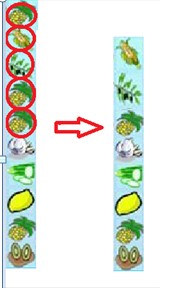I
like playing game with my friend, although sometimes looks pretty
naive. Today I invent a new game called LianLianKan. The game is about
playing on a number stack.
Now we have a number stack, and we should
link and pop the same element pairs from top to bottom. Each time, you
can just link the top element with one same-value element. After pop
them from stack, all left elements will fall down. Although the game
seems to be interesting, it‘s really naive indeed.

To
prove I am a wisdom among my friend, I add an additional rule to the
game: for each top element, it can just link with the same-value element
whose distance is less than 6 with it.
Before the game, I want to check whether I have a solution to pop all elements in the stack.
There are multiple test cases.
The first line is an integer N indicating the number of elements in the stack initially. (1 <= N <= 1000)
The next line contains N integer ai indicating the elements from bottom to top. (0 <= ai <= 2,000,000,000)
For each test case, output “1” if I can pop all elements; otherwise output “0”.
2
1 1
3
1 1 1
2
1000000 1
LL a[maxn];
int vis[maxn];
int flag=0;
map<int,int> kiss;
int n;
void dfs(int nn,int cur)
{
if(nn>n)
return;
if(vis[nn]==1)
dfs(nn+1,cur);
if(cur==n)
{
flag=1;
return;
}
int m=nn;
REP_1(i,5)
{
m++;
while(1)
{
if(m>n)
return;
if(vis[m]==0)
break;
m++;
}
if(a[m]==a[nn])
{
vis[nn]=1;
vis[m]=1;
dfs(nn+1,cur+2);
vis[nn]=0;
vis[m]=0;
}
}
}
int main()
{
while(RD(n)!=-1)
{
memset(vis,0,sizeof(vis));
kiss.clear();
REP_1(i,n)
{
RD(a[i]);
kiss[a[i]]++;
}
if(n%2==1)
{
flag=0;
printf("0\n");
continue;
}
int flag2=1;
REP_1(i,n)
{
if(kiss[a[i]]%2==1)
{
flag2=0;
break;
}
}
if(flag2==0)
{
printf("0\n");
continue;
}
//dfs(1,0);
cout<<"1"<<endl;
}
}
